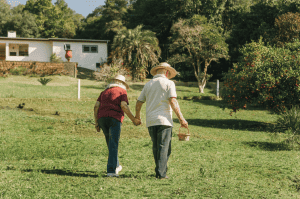Old age comes with the risk of one’s immunity deteriorating. As people age, it’s normal for them to experience health challenges (mental and physical). Bones shrink, and their density reduces. Cognitive abilities can also start declining. An older adult’s arteries and blood vessels may begin stiffening, forcing their heart to work extra hard to pump blood, increasing the risk of heart-related illnesses.
Good health in old age enables seniors to live independently for as long as possible, especially those who want to age in place. Discussed below are four ways seniors can maintain good health.

1.Get involved in social activities
Social activities promote a senior’s emotional and mental health while giving them a sense of belonging. Remaining socially active is mainly vital for seniors who can, at times, become isolated and lonely. When a senior gets involved in social activities, they enjoy many health rewards, including their:
- Emotional health improving
- Cognitive function being improved
- The immune system becomes stronger
- Relationships becoming stronger
Group workout classes, hiking, and other social activities with peers help older adults form healthy habits, resulting in a healthier lifestyle. Moving into a senior living community such as Longhouse, where there are many opportunities for the elderly to remain socially active and help ensure your loved one is never alone or isolated.
2.Prioritize physical activity
Regular exercise and physical activity improve an older adult’s physical and mental health, which are key to maintaining independence as they age. Staying active can delay or prevent a host of health issues associated with old age. Regular physical activity, which can be at least 150 minutes a week, offers several rewards, including:
- Preventing disease: Maintaining a regular workout routine enhances a senior’s immune function while preventing common illnesses like diabetes and heart disease
- Reducing fall risks: Since the elderly are at higher fall risk, keeping up with physical activity boosts their flexibility and strength. This enhances coordination and balance, lowering the risk of falling
- Better mental health: Exercise leads to the production of feel-good hormones, which serve as a stress reliever, leaving seniors feeling satisfied and happy
3.Get good quality sleep
Good quality sleep is vital for an older adult’s well-being and health, which is essential for their bodies to function optimally. Getting a good night’s sleep helps clear and rejuvenate a senior’s mind, lowering the possibility of developing Alzheimer’s.
It also energizes your loved one, giving them more energy to move around during the day without feeling tired or weak. When a senior has difficulties maintaining a healthy weight, they’re at a higher risk of severe medical conditions like heart attacks and kidney disease.
Getting sufficient sleep at night enables a senior’s body to burn calories, helping maintain a healthy weight. If an older adult doesn’t get quality sleep at night, they’ll be less energized and stressed. Nevertheless, sticking to a regular sleep pattern can help them lower stress levels.
4.Focus on good nutrition
While all age groups require good nutrition, it’s more imperative for seniors. A healthy diet comes in handy for older adults by:
- Giving them energy
- Preventing particular illnesses like hypertension
- Maintaining healthy weight
A senior’s diet should be nutrient-rich. A proper diet should contain:
- Fruits and vegetables
- Low-fat meat
- Low-fat dairy products
- Legumes, whole grains, seeds, and nuts
Endnote
Maintaining good health is vital for an older adult’s better quality of life. Consider implementing these tips to help maintain a senior’s good health.
